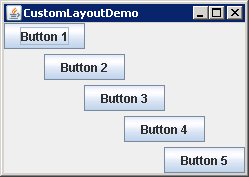
/*
*
* Copyright (c) 1998 Sun Microsystems, Inc. All Rights Reserved.
*
* Sun grants you ("Licensee") a non-exclusive, royalty free, license to use,
* modify and redistribute this software in source and binary code form,
* provided that i) this copyright notice and license appear on all copies of
* the software; and ii) Licensee does not utilize the software in a manner
* which is disparaging to Sun.
*
* This software is provided "AS IS," without a warranty of any kind. ALL
* EXPRESS OR IMPLIED CONDITIONS, REPRESENTATIONS AND WARRANTIES, INCLUDING ANY
* IMPLIED WARRANTY OF MERCHANTABILITY, FITNESS FOR A PARTICULAR PURPOSE OR
* NON-INFRINGEMENT, ARE HEREBY EXCLUDED. SUN AND ITS LICENSORS SHALL NOT BE
* LIABLE FOR ANY DAMAGES SUFFERED BY LICENSEE AS A RESULT OF USING, MODIFYING
* OR DISTRIBUTING THE SOFTWARE OR ITS DERIVATIVES. IN NO EVENT WILL SUN OR ITS
* LICENSORS BE LIABLE FOR ANY LOST REVENUE, PROFIT OR DATA, OR FOR DIRECT,
* INDIRECT, SPECIAL, CONSEQUENTIAL, INCIDENTAL OR PUNITIVE DAMAGES, HOWEVER
* CAUSED AND REGARDLESS OF THE THEORY OF LIABILITY, ARISING OUT OF THE USE OF
* OR INABILITY TO USE SOFTWARE, EVEN IF SUN HAS BEEN ADVISED OF THE
* POSSIBILITY OF SUCH DAMAGES.
*
* This software is not designed or intended for use in on-line control of
* aircraft, air traffic, aircraft navigation or aircraft communications; or in
* the design, construction, operation or maintenance of any nuclear
* facility. Licensee represents and warrants that it will not use or
* redistribute the Software for such purposes.
*/
/*
* CustomLayoutDemo.java requires one other file:
* DiagonalLayout.java
*/
import java.awt.Component;
import java.awt.Container;
import java.awt.Dimension;
import java.awt.Insets;
import java.awt.LayoutManager;
import javax.swing.JButton;
import javax.swing.JFrame;
public class CustomLayoutDemo {
public static void addComponentsToPane(Container pane) {
pane.setLayout(new DiagonalLayout());
pane.add(new JButton("Button 1"));
pane.add(new JButton("Button 2"));
pane.add(new JButton("Button 3"));
pane.add(new JButton("Button 4"));
pane.add(new JButton("Button 5"));
}
/**
* Create the GUI and show it. For thread safety,
* this method should be invoked from the
* event-dispatching thread.
*/
private static void createAndShowGUI() {
//Create and set up the window.
JFrame frame = new JFrame("CustomLayoutDemo");
frame.setDefaultCloseOperation(JFrame.EXIT_ON_CLOSE);
//Set up the content pane.
addComponentsToPane(frame.getContentPane());
//Display the window.
frame.pack();
frame.setVisible(true);
}
public static void main(String[] args) {
//Schedule a job for the event-dispatching thread:
//creating and showing this application's GUI.
javax.swing.SwingUtilities.invokeLater(new Runnable() {
public void run() {
createAndShowGUI();
}
});
}
}
/*
* 1.2+ version. Used by CustomLayoutDemo.java.
*/
class DiagonalLayout implements LayoutManager {
private int vgap;
private int minWidth = 0, minHeight = 0;
private int preferredWidth = 0, preferredHeight = 0;
private boolean sizeUnknown = true;
public DiagonalLayout() {
this(5);
}
public DiagonalLayout(int v) {
vgap = v;
}
/* Required by LayoutManager. */
public void addLayoutComponent(String name, Component comp) {
}
/* Required by LayoutManager. */
public void removeLayoutComponent(Component comp) {
}
private void setSizes(Container parent) {
int nComps = parent.getComponentCount();
Dimension d = null;
//Reset preferred/minimum width and height.
preferredWidth = 0;
preferredHeight = 0;
minWidth = 0;
minHeight = 0;
for (int i = 0; i < nComps; i++) {
Component c = parent.getComponent(i);
if (c.isVisible()) {
d = c.getPreferredSize();
if (i > 0) {
preferredWidth += d.width/2;
preferredHeight += vgap;
} else {
preferredWidth = d.width;
}
preferredHeight += d.height;
minWidth = Math.max(c.getMinimumSize().width,
minWidth);
minHeight = preferredHeight;
}
}
}
/* Required by LayoutManager. */
public Dimension preferredLayoutSize(Container parent) {
Dimension dim = new Dimension(0, 0);
int nComps = parent.getComponentCount();
setSizes(parent);
//Always add the container's insets!
Insets insets = parent.getInsets();
dim.width = preferredWidth
+ insets.left + insets.right;
dim.height = preferredHeight
+ insets.top + insets.bottom;
sizeUnknown = false;
return dim;
}
/* Required by LayoutManager. */
public Dimension minimumLayoutSize(Container parent) {
Dimension dim = new Dimension(0, 0);
int nComps = parent.getComponentCount();
//Always add the container's insets!
Insets insets = parent.getInsets();
dim.width = minWidth
+ insets.left + insets.right;
dim.height = minHeight
+ insets.top + insets.bottom;
sizeUnknown = false;
return dim;
}
/* Required by LayoutManager. */
/*
* This is called when the panel is first displayed,
* and every time its size changes.
* Note: You CAN'T assume preferredLayoutSize or
* minimumLayoutSize will be called -- in the case
* of applets, at least, they probably won't be.
*/
public void layoutContainer(Container parent) {
Insets insets = parent.getInsets();
int maxWidth = parent.getWidth()
- (insets.left + insets.right);
int maxHeight = parent.getHeight()
- (insets.top + insets.bottom);
int nComps = parent.getComponentCount();
int previousWidth = 0, previousHeight = 0;
int x = 0, y = insets.top;
int rowh = 0, start = 0;
int xFudge = 0, yFudge = 0;
boolean oneColumn = false;
// Go through the components' sizes, if neither
// preferredLayoutSize nor minimumLayoutSize has
// been called.
if (sizeUnknown) {
setSizes(parent);
}
if (maxWidth <= minWidth) {
oneColumn = true;
}
if (maxWidth != preferredWidth) {
xFudge = (maxWidth - preferredWidth)/(nComps - 1);
}
if (maxHeight > preferredHeight) {
yFudge = (maxHeight - preferredHeight)/(nComps - 1);
}
for (int i = 0 ; i < nComps ; i++) {
Component c = parent.getComponent(i);
if (c.isVisible()) {
Dimension d = c.getPreferredSize();
// increase x and y, if appropriate
if (i > 0) {
if (!oneColumn) {
x += previousWidth/2 + xFudge;
}
y += previousHeight + vgap + yFudge;
}
// If x is too large,
if ((!oneColumn) &&
(x + d.width) >
(parent.getWidth() - insets.right)) {
// reduce x to a reasonable number.
x = parent.getWidth()
- insets.bottom - d.width;
}
// If y is too large,
if ((y + d.height)
> (parent.getHeight() - insets.bottom)) {
// do nothing.
// Another choice would be to do what we do to x.
}
// Set the component's size and position.
c.setBounds(x, y, d.width, d.height);
previousWidth = d.width;
previousHeight = d.height;
}
}
}
public String toString() {
String str = "";
return getClass().getName() + "[vgap=" + vgap + str + "]";
}
}